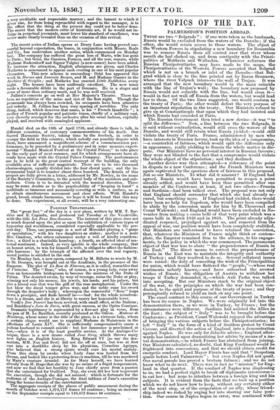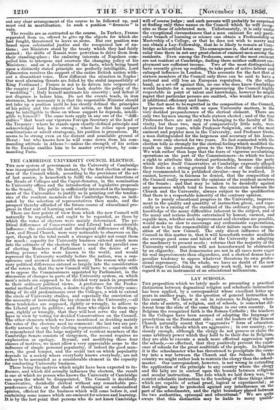TOPICS OF THE DAY.
PALMERSTON'S POSITION ABROAD.
THERE are two " Belgrade " : if one were taken as the landmark, Russia would be excluded from the waters of the Danube ; if the other, she would retain access to those waters. The object of the Western Powers in stipulating a new boundary for Bessarabia was to remove Russia from all control over that river whose mouth she had choked up, and from contiguity with the Princi- palities of Moldavia and Wallachia. Whatever reference the Russian Plenipotentiaries may have made to the maps, the Plenipotentiaries of the Western Powers accepted that Bolgrad which is not on a branch or inlet of the Danube—that Bol- grad which is close to the line pointed out by Baron Brunnow, where the river Yalpuek intersects the wall of Traj an. It was arranged that the new boundary would in the main coincide with the line of Trojan's wall ; the boundary now proposed by Russia would not coincide with the line, but would cross it- -would in fact not wall off Russia from the waters, but would lead. her to them. Of the two lines suggested, one would conform to
the treaty of Paris; other would defeat the very purpose of an important stipuation in the treaty. Our Ministers refused to give up at Constantinople that upon which they had insisted and which Russia had conceded at Paris.
The Russian Government then tried a new device—it was " to split the difference." Now, a line between the two Belgrade, it is said without contradiction, would still cross the waters of the Danube, and would still retain what Russia yielded—would still violate the treaty of Paris. France, administered by men who have interests in Russian favour, took up the idea of a compromise, —a counterfeit of fairness, which would split the difference only in appearance, really yielding to Russia the whole matter in dis- pute. Our Ministers have no personal interest in Russian favours ; they were not blinded to the fact that a compromise would violate the whole object of the stipulation ; and they declined. Another device was then attempted—a reference of the point in dispute to a new Conference ; and the French Ministers were again captivated by the spurious show of fairness in this proposal. Not so our Ministers. To what did it amount? If England had agreed, Russia would have been permitted to reopen a point already settled, and would have been thus permitted after one member of the Conference at least, if not two others—Prussia and Sardinia—had been talked over. The proposal was not only that England should surrender that which she had already se- cured, but something more. If England had yielded, there would have been no help for Napoleon, who would have been compelled. to abide by the concession made for him by M. Thouvenel and Count Walewski ; and England would have been excluded in No- vember from making a casus belli of that very point which was a casus belli in March 1856 and in 1853. The point already adju- dicated reopened, prejudged against us, and removed from the appeal of war, our position would have been completely stultified. Our Ministers are understood to have retained the conviction, that, whatever the Ministers of France might think or contem- plate, the Emperor remained firm to the alliance, to his engage- ments, to the policy in which the war commenced. The paramount object of that war was to abate " the preponderance of Russia in the East." The direct means to correct the preponderance of Russia in the East was to maintain the integrity and authority of Turkey ; and they resolved to do so. Several collateral issues were raised : the duty of conceding the wish of the Principalities for union, which would have flattered the "people,"—whose real sentiments nobody knows,—and have subserved the avowed wishes of Russia ; the obligation of Austria to withdraw her troops if Turkey demanded it,—which Aali Pasha was talked into accepting. But our Ministers stuck to the original object of the war, to the principles on which the war had been con- ducted, to the spirit and purpose of the treaty of peace ; and they peremptorily refused to yield an inch on any one point. The exact contrast to this course of our Government in Turkey has been its course in Naples. We were originally led into the demonstration there, as we were in Turkey, by France ; but the circumstances were different. Sardinia had assisted the Allies in the East ; the subject of " Italy " was to be brought before the Conference ; as President, Count Walewski enjoyed the advantage of bringing the various subjects before the Plenipotentiaries ; he left " Italy " in the form of a kind of fruitless protest by Count Cavour, and diverted the action of England into a demonstration against Naples. He was only for didactic advice ; England after- wards has insisted upon dramatizing her advice by means of a na- val demonstration,—in which France has abstained from joining. Our Ministers calculated, no doubt, that King Ferdinand would be frightened into concessions, and that we should obtain credit for energetic conduct. Lord dayor Finnis has said that " Despotism quails before Lord Palmerston" ; but even Naples did not quail. Our naval parade has proved a brutum fulmen ; and we do not know what to do next. There was in fact no " mission" for Eng- land in that quarter. If the conduct of Naples was displeasing to us, we had a perfect right to break off diplomatic intercourse— to cut her ; but none to interfere between a foreign king and his subjects. It is evident from the bets that we took up a position which we do not know how to keep, without any certainty either of the next step, or of the cooperation of an ally, whose friend- ship indeed we risked by urging her into sharing our false posi- tion. Our course in Naples began in error, was continued with-
out any clear arrangement of the course to be followed up, and must end in mortification. In such a position " firmness " is vain.
The results are as contrasted as the course. In Turkey, France separated from us, offered to give up the objects for whioh she had fought, threatened to leave us alone. But our position was based upon substantial justice and the recognized law of na- tions; our Ministers stood by the treaty which they had fairly earned ; the shifts of Russia were powerless to drive them from their standing-place ; the enduring interests of Napoleon com- pelled him to interpose and overrule the changing policy of his Violaters • and on a declaration of the facts, which being based upon a distinctly stated principle are perfectly intelligible, Lord Palmerston receives the su rt of the entire British nation with- out a dissentient voice. 1 ow different the situation in Naples ! Our most alarming threats are foiled by the stolid impassibility of Xing Ferdinand ; France is not to be driven into cooperation ; the country at Lord Palmerston's back doubts the policy of the " meddling " ; Italy herself mistrusts his sincerity ; and defeat if not disgrace is before him. Do not the events teach, in iron sternness, how necessary it is that the responsible Minister should not take up a position until he has clearly defined the principles of his policy and the objects of his action, so that his conduct may be intelligible to those on whose support he depends, intelli- gible to himself ? The same tests apply in any one of the " diffi- culties" that beset our vigorous Foreign Secretary at the head of the Treasury : where he stands upon clearly-defined principle and acknowledged law, he is strong ; where he relies upon paper combinations or adroit stratagems his position is precarious. He seems to be strong even on the distant and assailable ground of Herat : but who knows how he will come down from his com- manding attitude in Athens ?--unless the strength of his action in the Enable enables him to be master everywhere, by com- manding Paris.



























 Previous page
Previous page